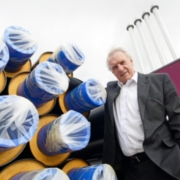Zero carbon heat for Gateshead
A bold new strategy to deliver zero carbon heating for Gateshead in just nine years has been approved by the Council's cabinet today.
Nationally, the Government is aiming for the UK as a whole to achieve zero carbon emissions by 2050 and has adopted a Clean Growth Strategy to deliver that.
Gateshead is aspiring to achieve that goal for all council buildings and homes by 2030 - a full 20 years earlier.
This is a key element of the Council's Climate Emergency Action Plan, following the authority declaring a climate emergency in 2019.
The Council recognises that decarbonisation of heat is essential to achieving its goal, as heat is the largest component of the council's carbon footprint, accounting for 45% of measured carbon emissions - currently around 17,500 council homes in Gateshead operate on gas boilers, which is 92% of the Council's total housing stock of 18,995 homes.
So the cabinet has now adopted a 'Zero Carbon Heat Strategy' with the ambition to:
- deliver up to £240m of heat networks, where Gateshead is already leading the way in the North East
- decarbonise the existing gas network which delivers gas to businesses and people's homes, with support for using hydrogen as an alternative fuel
- install of heat pumps, using small scale pilot projects to research their impact on fuel poverty, and support for installation in new build homes.
As well as reducing carbon emissions, the strategy aims to create the conditions for growth in jobs and skills in the supply chains for zero carbon heat, stimulating the green economy - a key strand of Gateshead's Economic Development Strategy.
Councillor John McElroy, Cabinet Member for Environment and Transport, said, "This is a real statement of intent for our ambitions to tackle climate change in Gateshead and reach our zero carbon goal by 2030.
"We already have a significant track record of investment in heat networks, so this is proven technology - now our challenge is to expand on that success and roll out zero carbon heating to a much wider audience across the borough.
"We are also supporting partners, such as Northern Gas Networks, in creating the conditions to see the use of clean hydrogen expand and grow, using their innovative R+D centre, INTEGReL, based in Low Thornley, Gateshead."
A heat network is made up of underground, insulated steel pipes which send hot water around that network, providing heating for both homes and other buildings.
Gateshead Council has already invested £60m in heat networks in the borough, and attracted significant grant funding.
The Gateshead District Energy Scheme on the Baltic Quarter already provides heating to key buildings like The Baltic, the Sage Gateshead and Gateshead College, as well as council offices, leisure centres and high rise flats in the town centre.
The Gateshead District Energy Scheme is currently powered by natural gas, but Gateshead is investing in the construction of mine water heating scheme and urban solar parks, which from 2022, will start supplying renewable energy through the network.
The Gateshead Energy Company, wholly owned by the Council, sells the heat at a lower than market rate to its customers.
Now there is an aspiration to take heat networks out to communities elsewhere in the borough.
APSE Energy can help your local authority decarbonise
A not-for-profit, discover how APSE Energy can help your council by clicking here.
Alternatively, please contact Phil Brennan, Head of APSE Energy, at [email protected], or Charlotte Banks, Energy Research & Project Officer, at [email protected].


.png)



.png)